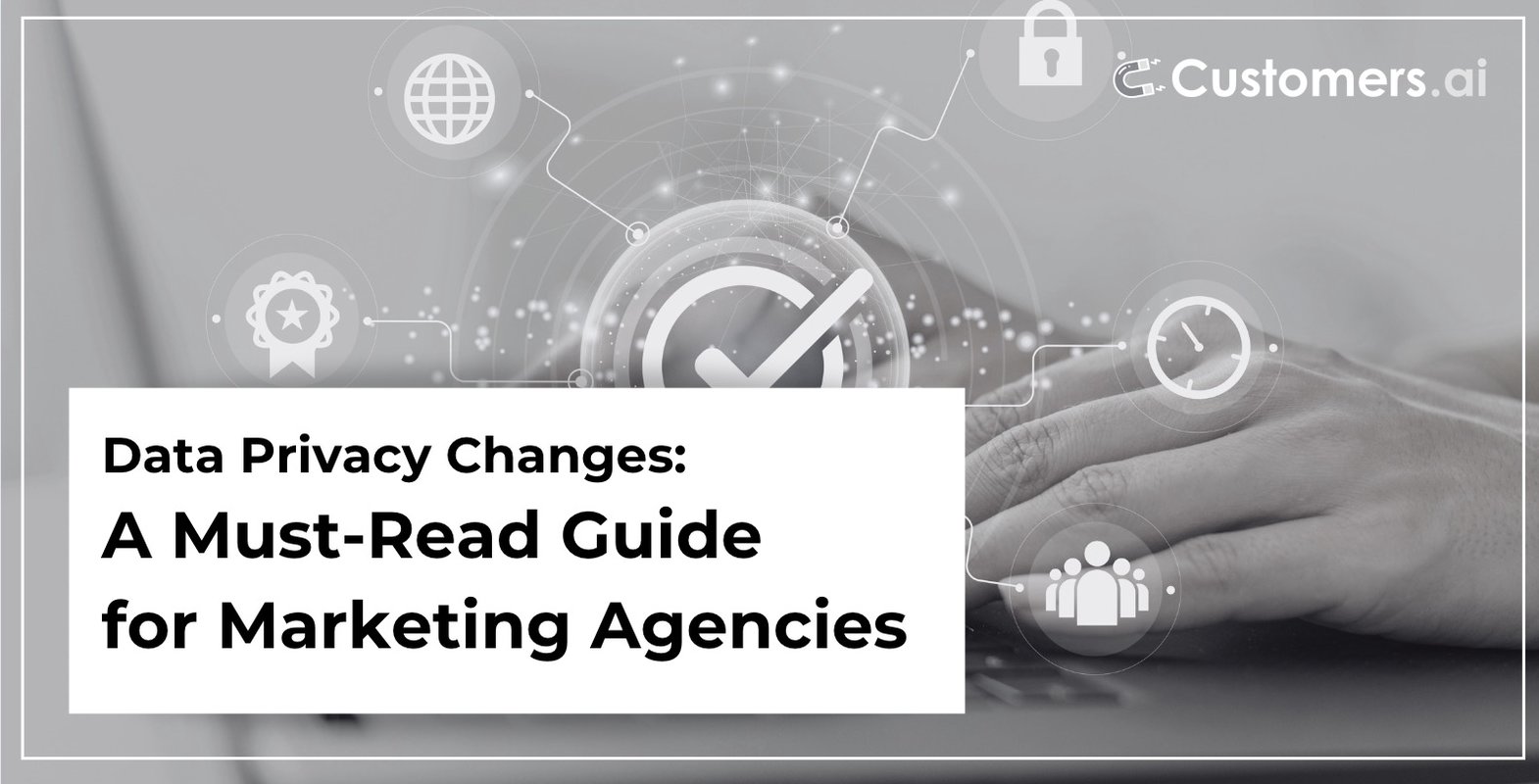When it comes to privacy, the winds of change are blowing stronger than ever. With landmark regulations like GDPR and CCPA taking hold in 2018 and 2020 respectively, data privacy has surged to the forefront of the tech landscape. And it doesn’t appear to be slowing down.
Giants like Google, Meta, and Apple have made data privacy their mission, and the outcomes are impacting the very core of advertising and marketing strategies. From the recent iOS 17 updates to the imminent deprecation of cookies in Google Chrome in 2024, the landscape is teeming with changes that are reshaping the way that we as marketers operate.
As we explore these changes, one thing becomes abundantly clear: the job of marketers is getting harder. Not simply because have to change what we are doing but because change is not a choice. In some cases, there are actual legal repercussions!
For marketing agencies, the challenge is even larger – adapt to all the changes, show value to your clients, and prove campaign ROI. No easy feat.
Our goal is to delve into a few of the major data privacy changes impacting marketing agencies and attempt to both dissect and illuminate the path forward. Let’s figure out how we can embrace these changes and evolve our strategies.
5 Major Data Privacy Changes Affecting Marketing Agencies
- Apple iOS 17 Updates
- Google Chrome Cookie Deprecation
- Google and Yahoo Email Spam Filter Update
- Google’s Decision to Phase Out Old Email Addresses
- Meta Ad-Free Subscriptions in EU
Convert Website Visitors into Real Contacts!
Identify who is visiting your site with name, email and more. Get 500 contacts for free!
1. Apple iOS 17 Updates
While the introduction of the App Tracking Transparency (ATT) framework in iOS 14 reshaped targeted advertising, iOS 17 brought another discreet, yet impactful change — link tracking protection.
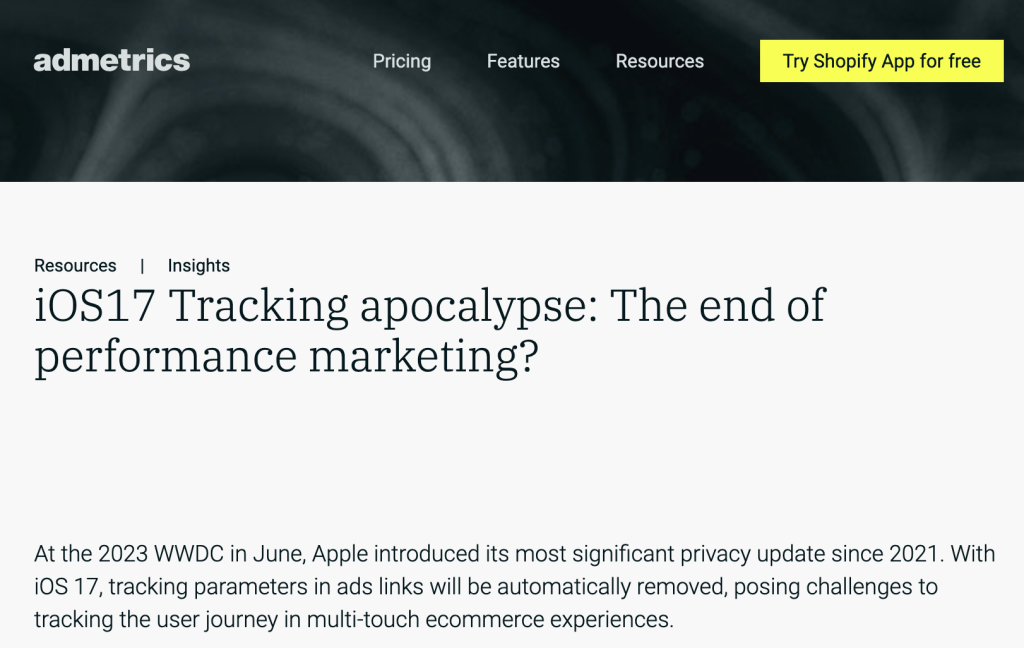
Source: Admetrics
From Apple’s press release:
“Some websites add extra information to their URLs in order to track users across other websites. Now this information will be removed from the links users share in Messages and Mail, and the links will still work as expected. This information will also be removed from links in Safari Private Browsing.”
Essentially – say goodbye to clickID data.
What does iOS 17 mean for agencies?
We wrote a pretty comprehensive post about iOS 17 already but here’s the deal – cross-campaign tracking is now even more difficult and proving the value of your efforts requires new methods.
For agencies, you have to be able to show value and you have to be able to prove ROI. For Google and Meta ads campaigns, click IDs are what we rely on. The loss of that data will make data collection less accurate and our ability to show results and make decisions more challenging.
Now, the good news is that only about 30% of global users are on Safari. Make sure to check your data to see the percentage of visitors to your own site to better understand the impact.
2. Google Chrome Cookie Deprecation
Google’s decision to deprecate third-party cookies was certainly unwelcome news but one we’ve been aware of for some time. Unfortunately, the time has come with Chrome beginning the phase-out in Q1 2024.
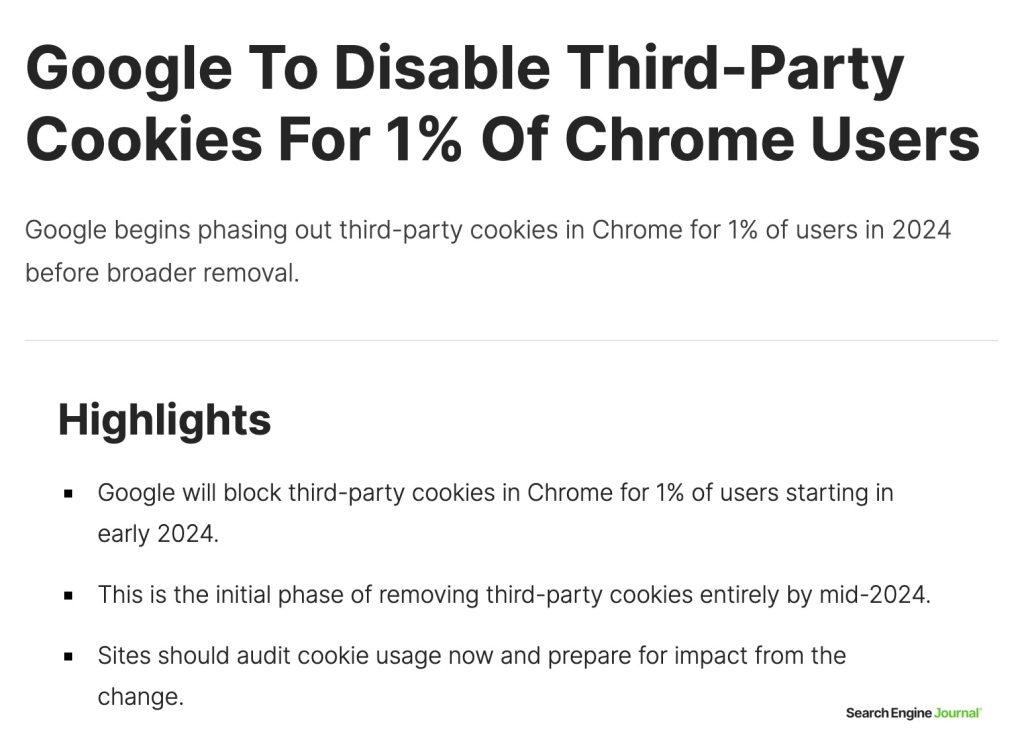
The deprecation of third-party cookies means that advertisers will no longer have unrestricted access to cross-site tracking data, something marketing agencies rely on to prove campaign value.
What does Google Chrome cookie deprecation mean for agencies?
- Loss of Cross-Site Tracking Precision: Without third-party cookies, the ability to track users seamlessly across different websites diminishes. Advertisers face a challenge in maintaining the granularity of user behavior insights, affecting the precision of targeted advertising.
- Reduced Personalization Accuracy: The deprecation poses a hurdle for marketers who heavily rely on user data for personalized advertising. Targeting tailored content to specific audiences becomes more challenging, potentially leading to less accurate and impactful campaigns.
- Attribution Modeling Complexity: Tracking user journeys and attributing conversions will be more complex without the consistency provided by third-party cookies. Marketing agencies in particular may need to invest in alternative attribution models to understand and prove the effectiveness of advertising efforts to clients.
- Impact on Retargeting Strategies: Retargeting, a staple in many advertising strategies, faces a setback. Without the seamless tracking capabilities of third-party cookies, marketers may find it challenging to effectively retarget users who have interacted with client websites.
- Navigating Compliance and User Trust: The shift away from third-party cookies is not only a technical challenge but also a navigational one in terms of compliance and user trust. Marketers must find ways to deliver personalized experiences while respecting user privacy and building trust.
The key to success lies in adapting new strategies and exploring alternative methods for user-tracking.
3. Google and Yahoo Email Spam Filter Update
The email spam filter update from Google and Yahoo brought with it two major changes – mandatory digital email signing and a 0.3% complaint rate threshold.
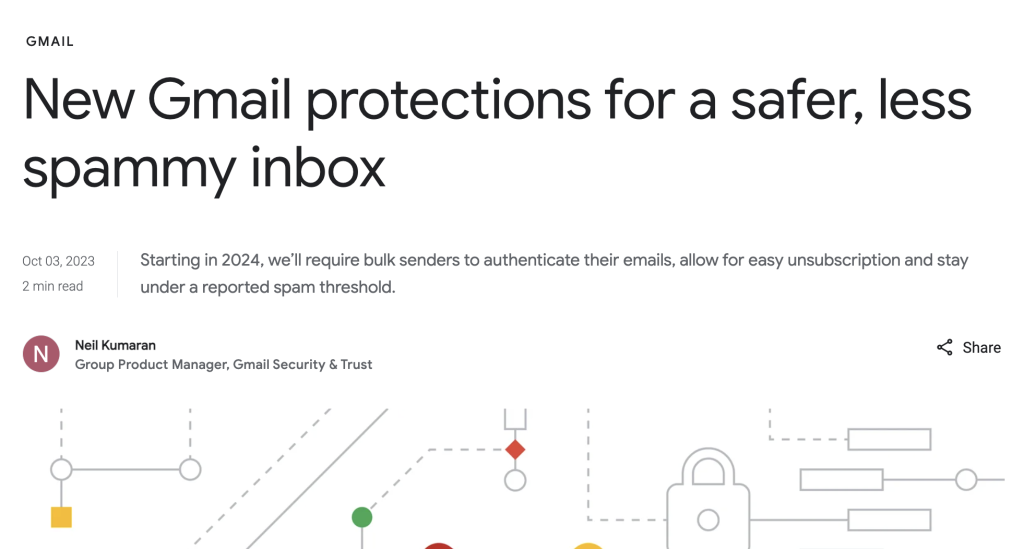
Here’s a breakdown:
- Mandatory Digital Email Signing. Senders with over 5,000 emails must use DomainKeys Identified Mail (DKIM) for digital signing. This is already a best practice but hasn’t been a requirement until now.
- 0.3% Complaint Rate. A complaint rate over 0.3% now poses the risk of being blocked. A complain occurs when a user marks an email as spam, not when they unsubscribe.
These updates are a proactive move by Google and Yahoo to enhance the user experience by reducing unwanted or irrelevant emails in users’ inboxes and creating better privacy specifications.
What do the Google and Yahoo email filter updates mean for agencies?
The email spam filter updates by Google and Yahoo mean that marketing agencies are now contending with stricter criteria for inbox placement. Messages that may have once sailed smoothly into the inbox are now subject to heightened scrutiny and email marketing agencies are going to have to be aware.
The challenge lies in ensuring that legitimate, valuable content doesn’t get caught in the crossfire of these stringent filters. It also means you have to focus on reducing or preventing spam complaints and that comes from better emails.
A few other tips to consider to keep your spam complaints low:
- Offer clear unsubscribe options
- Include multiple unsubscribe links in your emails
- Use shorter, engagement-based outreach cadences
- Diversify outreach communication channels
- Create tighter, more targeted audiences
- Custom and segment your email outreach
Adhering to these new policies means you must foster engagement, be transparent, and offer value to your users.
4. Google’s Decision to Phase Out Old Email Addresses
As of December 1, 2023, inactive Google accounts will be deleted. This includes account contents like photos, messages, Calendar appointments, Drive documents, and even YouTube videos.
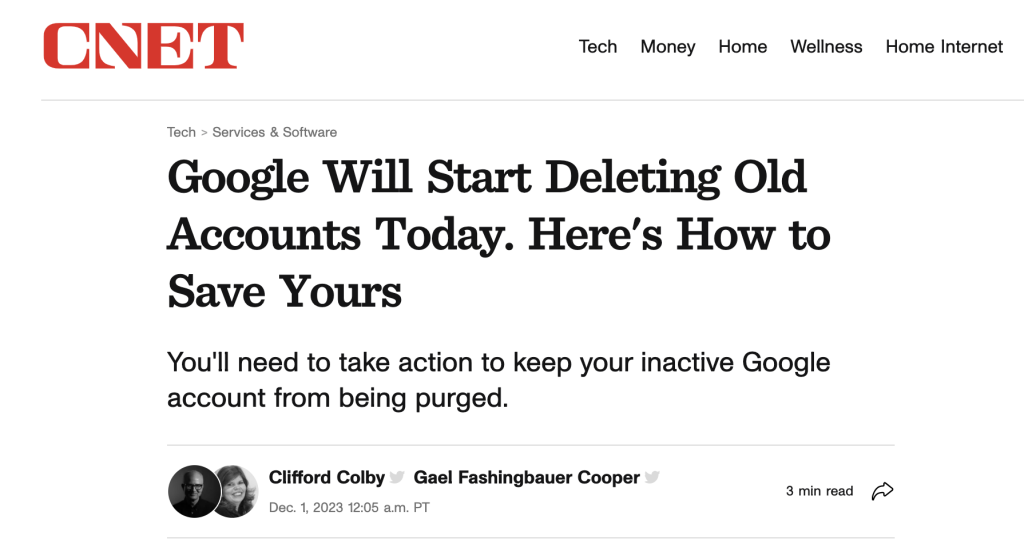
According to CNet:
“If an account hasn’t been used for a while, Google said it’s more likely to be hacked…to reduce this risk, Google may delete an account and its contents if it hasn’t been used or signed into for at least two years. If you haven’t logged into an account since 2021, Google may get rid of it.
If you’re worried about someone grabbing your deleted account, rest easy: If Google deletes an inactive account, that Gmail address cannot be used again to create a new account, Google said.”
What does Google email deletion mean for agencies?
Not too much in the grand scheme of things. However, it could have an impact on your email marketing campaigns and specifically, on email deliverability.
For example, if you aren’t regularly scrubbing email lists and end up with a high number of deleted contacts in that list, you now have a much higher bounce rate. High bounce rates mean lower email deliverability and can ding your campaigns.
Here are a few best practices to consider to keep your lists clean:
- Regular Email List Maintenance: Implement processes to identify and remove outdated email addresses, ensuring that campaigns reach an audience with active and valid contact information.
- Encourage Email List Updates: Implement strategies such as targeted campaigns or newsletters specifically designed to prompt subscribers to provide current contact information.
- Leverage Multi-Channel Engagement: Explore social media, messaging apps, or other direct communication platforms to maintain engagement with users who may be less active on their email accounts.
- Implement Re-Engagement Campaigns: Encourage inactive subcribers to reconfirm their interest in your content, or provide incentives to update their email addresses to ensure they remain part of your active audience.
Google’s initiative to phase out old email addresses underscores the importance of adaptability in the realm of email marketing. By proactively adjusting practices and embracing a multi-faceted approach to audience engagement, marketers can position themselves for success in an environment where email addresses are dynamic and subject to change.
5. Meta Ad-Free Subscriptions in EU
As the EU continues its push toward privacy, Meta is trying to do whatever it takes to adapt to the new rules and keep their business profitable.
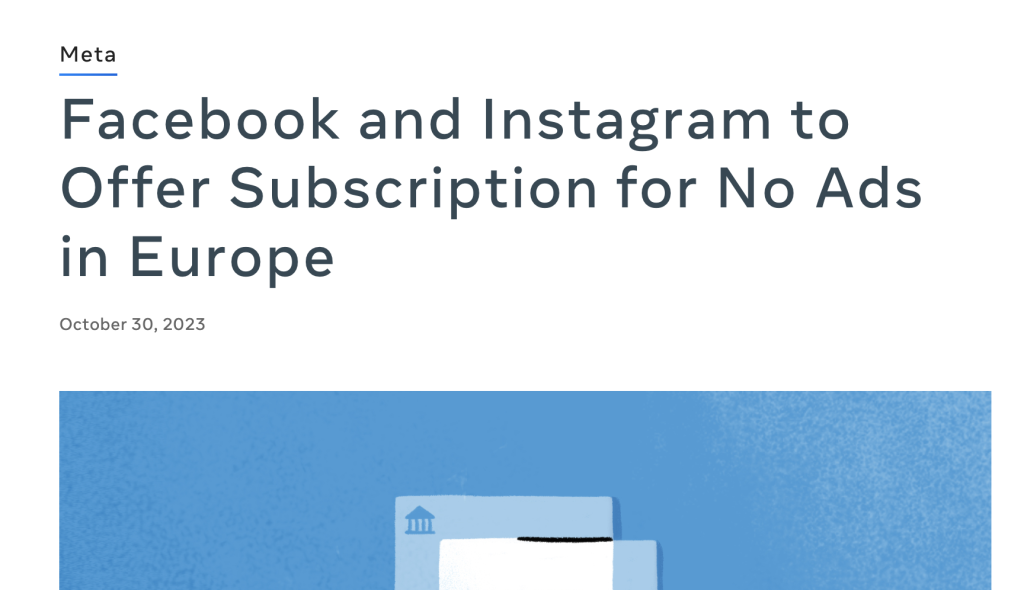
This latest update, a paid ‘no ads’ version of Facebook and Instagram started rolling out November 2023.
What does ‘Ad-Free’ Facebook mean for agencies?
If you are only marketing in the US, nothing. However, if you are marketing in the EU, you could start to see an impact on Facebook ads performance.
It’s worth noting the price to remove ads is €9.99/mo so we don’t foresee a significant number of people jumping on the bandwagon.
That being said, the removal of ads means there are a few things marketing agencies must consider:
- Shift in Targeting Dynamics: The introduction of ad-free subscriptions alters the dynamics of audience targeting. Marketers relying heavily on Meta’s ad platform may experience a shift in the composition of their target audience, as ad-free subscribers may differ significantly in behavior and preferences.
- Reevaluation of Ad Content and Placement: Marketers need to reassess the content and placement of their ads to cater to the remaining ad-supported user base. Considering App Store Optimization is another route they can take if their product supports the criteria of being optimized for that space. This may involve refining targeting criteria, optimizing ad creative, and strategically placing ads to maximize visibility among users who have opted for the ad-supported model.
- Enhanced Focus on Creativity and Quality: The competition for attention among ad-supported users intensifies with the introduction of ad-free subscriptions. Marketers need to elevate the quality and creativity of their ad content to capture and retain the attention of users who choose to remain in the ad-supported ecosystem.
As Meta pioneers the ad-free subscription model in the EU, marketing agencies must recalibrate their strategies to accommodate this shift.
AI-Powered Advertising
How to Unlock AI and Lead Capture Tech for 10X Return on Ad Spend


HOSTED BY
Larry Kim
Founder and CEO, Customers.ai
How Marketing Agencies Can Adapt to Privacy Changes
Every time a new policy or regulation is announced, it’s easy to freak out. After all, each one has an impact on our business and when taken together, there is a lot to consider.
The good thing is marketers are sharp and they are adaptable. We know that marketing agencies will adjust their strategies and use the resources they have to ensure clients and campaigns are successful.
As these new regulations and privacy updates roll out, we think there are a few things agencies can do to stay ahead of the game and adapt.
Invest in First-Party Data
First-party data, comprised of information collected directly from users who willingly engage with a brand is essential as privacy regulations continue to roll out.
What makes first-party data so valuable is that unlike third-party data, which is often obtained from external sources, first-party data is inherently consented to, providing a foundation of trust between marketers and their audience and preventing any penalties.
First-party data not only enables marketers to comply with evolving privacy standards but also empowers them to build authentic, personalized connections with their audience.
The challenge is, first-party data is prized because it’s hard to get. We have looked at some strategies previously but what we will say is, start capturing the visitors on your clients’ websites.
These people are already familiar with the brand and already showing interest. You can do this with the Customers.ai Website Visitor ID X-Ray pixel. Just place a small piece of code on the site and start capturing the names, email addresses, phone numbers and more of people interested in your clients’ products or services.
Then, throw the emails into remarketing campaigns and start capturing that data!
To install the Website Visitor ID X-Ray Pixel, sign up (for FREE!), go to your dashboard, and navigate to My Automations.
Select + New Automation and get your pixel. We have easy install options for Google Tag Manager, WordPress, and Shopify, or you can install the pixel manually.
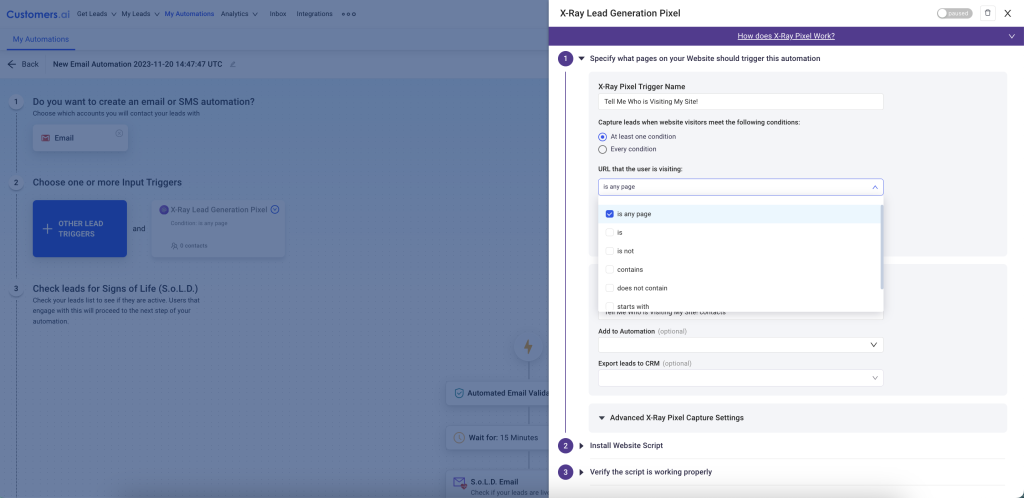
Diversify Marketing Channels
Privacy changes aren’t stopping any time soon so it’s imperative for marketing agencies to diversify their approach beyond traditional channels like cookies and emails. The era of relying solely on these methods is over and a strategic shift towards alternative channels is needed.
Embrace alternative channels such as influencer marketing, contextual advertising, social media platforms, and direct communication methods like push notifications and SMS marketing is crucial. These approaches offer privacy-friendly options, allowing agencies to navigate the shifting landscape while maintaining personalized and effective communication with their audience.
Utilize Technology and Tools
One of the tools to fight against the changes is…tools. Marketing agencies can fortify their strategies and protect themselves by leveraging cutting-edge technology and tools. The right tools can play a dual role—facilitating compliance with stringent data protection measures and streamlining processes for enhanced efficiency.
Some tools to consider:
- Privacy Management Platforms: Privacy management platforms centralize data governance and compliance activities. These platforms assist in tracking and managing user consent, ensuring that marketing activities align with privacy regulations.
- Consent Management Tools: Consent management tools streamline the process of obtaining and managing user consent. These tools not only facilitate compliance with regulations like GDPR but also enhance transparency in data usage practices.
- Automated Marketing Platforms: Invest in automated marketing platforms that allow for the seamless execution of campaigns while ensuring compliance with privacy regulations. These platforms often include features like consent tracking and automated opt-outs.
- Machine Learning for Personalization: Harness machine learning algorithms to personalize marketing efforts without relying on individual user data. By analyzing patterns and behaviors at scale, machine learning enables targeted campaigns without compromising privacy.
Technology is an indispensable ally for marketing agencies when it comes to moving forward. By incorporating advanced solutions for compliance and harnessing the power of automation, agencies not only navigate the complexities of data protection but also position themselves for increased efficiency and effectiveness.
Moving Your Marketing Strategies Forward
In the era of data privacy, the tech industry is undergoing a profound transformation. Giants like Google, Meta, and Apple have made data privacy a central mission, ushering in changes that reverberate through everything we do. From Apple’s discrete but impactful iOS 17 updates to Google’s imminent cookie deprecation in 2024, the marketing terrain is undergoing a seismic shift.
As marketers, change is not an option—it’s a necessity. There are actual legal repercussions for some of these privacy updates and as a result, marketers find themselves navigating a complex landscape where evolution is not optional. The job is undeniably getting harder, requiring a delicate balance between innovation and compliance.
Marketing agencies have an extra challenge. They must proactively shape their strategies, embracing first-party data collection, diversifying marketing channels beyond traditional methods, and leveraging technology and tools while at the same time continuing to show value to clients.
The journey ahead is challenging, but for the adaptable marketer, it is an opportunity for growth and resilience in a privacy-focused era.
Convert Website Visitors into Real Contacts!
Identify who is visiting your site with name, email and more. Get 500 contacts for free!
Important Next Steps
- See what targeted outbound marketing is all about. Capture and engage your first 500 website visitor leads with Customers.ai X-Ray website visitor identification for free.
- Talk and learn about sales outreach automation with other growth enthusiasts. Join Customers.ai Island, our Facebook group of 40K marketers and entrepreneurs who are ready to support you.
- Advance your marketing performance with Sales Outreach School, a free tutorial and training area for sales pros and marketers.
Data Privacy for Marketing Agencies FAQs
Q: How do data privacy changes influence targeted advertising for marketing agencies?
Agencies must ensure that targeted ads comply with data privacy regulations, avoiding the use of sensitive personal information without explicit consent.
Q: What steps should marketing agencies take to comply with data privacy regulations?
Agencies should conduct privacy assessments, update privacy policies, and implement robust data protection measures to comply with evolving regulations.
Q: How can marketing agencies adapt their email marketing strategies to comply with data privacy laws?
Agencies should obtain clear consent for email marketing, provide opt-out options, and refrain from purchasing email lists without explicit permission.
Q: Are there specific data breach notification requirements for marketing agencies?
Yes, agencies must promptly notify authorities and affected individuals in the event of a data breach, as mandated by various data protection laws.
Q: How do data privacy changes impact the use of customer data for analytics in marketing?
Agencies must ensure anonymization or pseudonymization of customer data used for analytics to comply with privacy regulations and protect individual identities.
Q: Can marketing agencies still use cookies for tracking user behavior under new data privacy laws?
Yes, but agencies may need to obtain user consent for cookies and clearly explain their purpose, ensuring compliance with regulations like GDPR.
Q: How does data privacy impact the collection and use of customer feedback by marketing agencies?
Agencies must handle customer feedback responsibly, obtaining consent for its collection and ensuring that it does not reveal sensitive personal information without permission.
Q: What are the implications of data privacy changes on cross-border data transfers for marketing agencies?
Agencies must adhere to data transfer restrictions and implement safeguards when transferring personal data across borders, as per regulations like GDPR.
Q: How can marketing agencies navigate the challenges of balancing personalized marketing with data privacy concerns?
Agencies can adopt privacy-by-design principles, prioritize user consent, and use anonymized data to strike a balance between personalization and privacy.
Q: Are there specific regulations regarding the use of AI in marketing that agencies should be aware of?
While not specific to AI, data privacy laws require transparency in AI algorithms and demand that agencies avoid discriminatory practices in targeted marketing.
Q: How does the concept of “data minimization” apply to marketing agencies?
Data minimization requires agencies to collect and process only the data necessary for a specific purpose, reducing the risk of privacy breaches and ensuring compliance.
Q: What resources are available for marketing agencies to stay updated on evolving data privacy regulations?
Agencies can stay informed through industry associations, legal updates, and by regularly checking official websites of data protection authorities for the latest guidelines and changes.
